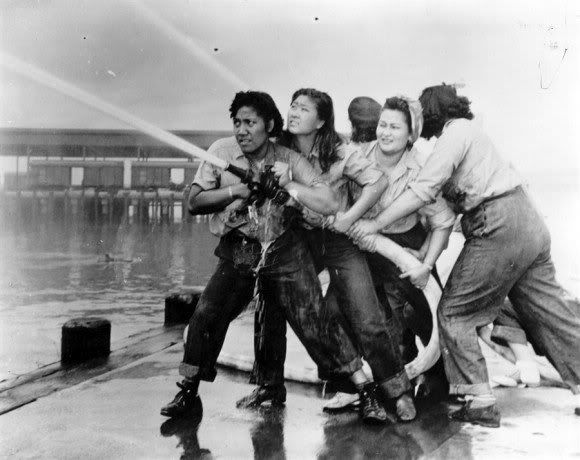American History
Related: About this forumFamous photo of female Pearl Harbor firefighters debunked

Getty images
By Eric Pfeiffer | The Sideshow – Mon, Dec 12, 2011
A photograph of three women reportedly fighting fires in the aftermath of the Japanese attack on Pearl Harbor has been debunked. Katherine Lowe, 96, who is the woman standing second from the right in the picture, says that while the photo is real, it wasn't actually taken on December 7, 1941.
On the morning of Dec. 7, "We were ready to go to church," Lowe told msnbc.com. "We didn't know we were at war. We went to church anyway. We were looking at all the planes bombing."
Lowe says she and her co-workers at the Dole pineapple factory did go to work as civilians at the Pearl Harbor Naval Shipyard, which did include fighting fires. However, she said the photograph that has received so much attention was likely taken during a training exercise later during the war.
The photograph has had quite the run through the history books. Originally taken by a freelance photographer and now archived at Getty Images, the caption reads, "Women firefighters direct a hose after the Japanese attack on the US naval base at Pearl Harbor."
http://news.yahoo.com/blogs/sideshow/famous-photo-female-pearl-harbor-firefighters-debunked-204920757.html
Tunkamerica
(4,444 posts)dipsydoodle
(42,239 posts)that with some of the rockabilly girls I know , looking at the way they're dressed , that could've been taken yesterday here in the UK.
Like the lady said - likely taken during a training exercise later during the war.
Good picture all the same. Thanks for posting.
Adsos Letter
(19,459 posts)When she was home over Thanksgiving we were watching a documentary on WWII, and I mentioned that there were many times when footage was "re-enacted" for the cameras. Not that the original event hadn't occurred (though that was also sometimes true) but that it had sometimes been re-enacted, or misidentified, for home consumption.
Thanks for posting this. It's a great photo!
ellisonz
(27,739 posts)The most notorious instance of such re-enactment being the flag raising on Iwo Jima. The way in which people remembered ingested news in World War II is a very interesting topic too; considering the differential affect of radio, print, and movie reels and what demographics preferred what medium is telling about how the war influenced home populations.
You're welcome! I would guess those are all Hawaii women and the one at the front is certainly Hawaii born and raised. I was doing a little digging about women in Hawaii in WWII and came across this interesting blog: http://www.womenofworldwariihawaii.com/ - click on blog archive to the right to see the majority of posts.
Adsos Letter
(19,459 posts)Are you familiar with The Death of Luigi Trastulli and Other Stories: Form and Meaning in Oral History by Allesandro Portelli? It contains several essays on Portelli's experiences in oral history projects in Europe and Appalachia. I don't recall whether he spoke directly to your point about various media and interpretation, but he understood that there was as much to learn from the subjective meaning different people assigned to an event as there was in any objective reality:
I quote this from Wikipedia rather than get up and actually look at the book; although it is in a bookcase about fifteen feet away from me, I am too lazy to get up and actually do my own work at the moment.
Do you know of any studies on the relationship between various media and interpretation? I'd be interested in reading up on that.
ellisonz
(27,739 posts)That's precisely what wikipedia is good for - basic introduction and quick reference.
No, and such a study would take quite a research project to produce. I'm a dreamer, and probably a better essayist than research historian. I've just seen and read tidbits from people during that period talking about either how little news they got or generally how it was ignored to some extent because people had other overriding concerns. If you were to compare this issue from WWII/Korea to Vietnam/Iraq II that would be an even more interesting project ![]()
Anyone else know of studies of differential consumption of media in relationship to the formulation of memories of historic events? ![]()
![]()